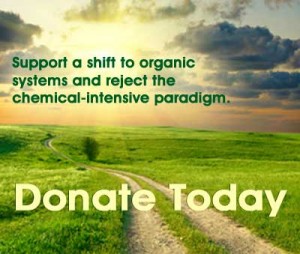24
Dec
Successes of the Past Help Meet Challenges of the Future: Have a Healthy New Year
(Beyond Pesticides, December 24, 2016) Beyond Pesticides thanks our members and supporters for being a part of a critical movement to advance sustainable and organic land and building management in 2016. As our Daily News takes a holiday break, returning Tuesday, January 3, 2017, we hope you will join us in reflecting on the progress made this year, and the critical challenges that lie ahead.
The road ahead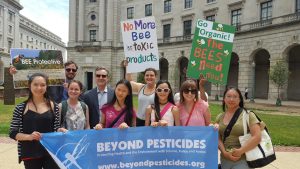
We are entering a period in our nation’s history with many serious concerns about the protection of public health and the environment. We have heard the President-elect’s rhetoric about the overreach of the Environmental Protection Agency (EPA), the burden of regulatory compliance, and the need to dismantle environmental programs. The nominee for EPA Administrator is on record as challenging science and the value of environmental protection.
In contrast, we have learned over the last several decades that protection of the environment contributes to a productive economy and healthier people. Beyond Pesticides’ databases track the scientific literature on pesticide hazards and alternatives, which clearly document the value of healthy ecosystems in providing ecosystem services that translate to reduced costs for farmers and land managers. Whether we’re talking about bees and other pollinators or predator insects, healthy ecosystems are critical to a sustainable future –our future.
This year’s election occurred in the midst of a societal shift to organic land management systems that protect our air, water, land, and reduce the threat of global climate change, while producing safe food in safe workplaces. Beyond Pesticides is a critical part of the progress we have made to create an over $40 billion organic sector, showing that the toxic chemicals that are deemed “acceptable” in our water, air, soil, food, and community parks and schoolyards are not necessary. With your support, we will build this wave of change from community to community, effecting an exponential shift away from toxic chemical use and a growing organic marketplace, regardless of a government controlled by corporate interests that seek to push toxic pesticide dependency. Our unique programs of community information assistance and hands-on training make the difference in the adoption of effective land and building management programs that eliminate pesticides.
Leading the way
Beyond Pesticides is leading the nation in stopping all hazardous pesticide use with on-the-ground practices. We were reminded of the importance of Beyond Pesticides’ program, which supports local action to protect community and environmental health, when U.S. EPA Administrator Gina McCarthy spoke to the Montgomery County (Maryland) Green Festival in April and told the packed auditorium that, “What happens in Montgomery County does not stay in Montgomery County.” She basically told the crowd that she couldn’t do anything unless it happened at the local level first. “Anything that manages to make the slow crawl to Capitol Hill has made it because it has had such fertile ground in our communities. . .Nothing makes its way there that’s a great idea, that’s really creative, and that has an opportunity to make a lasting impact unless it has been proven, time and time again, at the local level. . .then it makes its way up to the state when people are obnoxious and going to demand additional action, and so on and so on. So I have to congratulate you. . .” While she may not have been speaking directly to Takoma Park’s cosmetic lawn care chemical ban, followed by Montgomery County’s landmark ban, she could have been, along with the other local ordinances across the country that have been passed to protect health and the environment.
This year we’ve seen the continuation of local policies that illustrate misguided regressive state-level preemption laws. In South Portland, ME, the City Council passed the latest breakthrough pesticide ordinance, applying comprehensive restrictions on toxic chemical use to public and private property, a second for the state, following Ogunquit, ME’s award-winning policy. Washington D.C., a preemption-proof city because of its unique position in the federal system, also took bold steps in pesticide reform, updating its improperly implemented pesticide ordinance to protect children and waterways, and reflect the latest science and available organic materials.
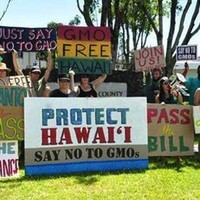
And communities in numerous states subject to preemption revealed the desire of localities to take action to protect their residents. In California, the cities of Irvine and Malibu passed organic focused pesticide reform ordinances. Following Minneapolis, MN’s organic focused resolution in 2015, its twin City of St. Paul, MN followed suit, echoing a request to the state to roll back state preemption policies that stop them from going further to restrict pesticides. As legal challenges in Hawaiian Counties and Montgomery County, MD show, the fight for local authority over toxic pesticide use continues.
As more schools and localities, like Villanova University, Antioch College, Macalester College, Milwaukie, OR, Howard County, MD and numerous Minnesota communities, continue to implement policy changes that protect pollinators from hazardous neonicotinoid insecticides, in 2016 we began to see states take part. In Maryland, the Pollinator Protection Act removes neonicotinoids from store shelves, and in Connecticut, An Act Concerning Pollinator Health passed unanimously through the legislature, enacting a range of common-sense protections for pollinators. As a result of coordinated advocacy efforts and over 15 local policies in Minnesota, Governor Dayton’s executive order made significant strides at addressing neonicotinoid use in agriculture.
Our work in Ogunquit and South Portland, Maine led to a teach-in at the Maine Organic Farming and Gardening Association (MOFGA) Country Fair in September to share with people across the state and northeast the experience of these communities and strategies for expanding the policy to other jurisdictions statewide. You can watch Part 1 of the session and Part 2 here. Nationwide, we continue to advance the pace of local policies and practices that embrace organic principles of land management.
In an effort to grow the pesticide reform movement, we launched the Map of U.S. Pesticide Reform Policies to show the widespread demand for pesticide restrictions and provide a tool, and accompanying blueprint, for advocates to use as they begin working in their community. We hope you’ll get in touch with us in the New Year to tell us about your efforts and how we can help bring them to fruition.
Bring on the goats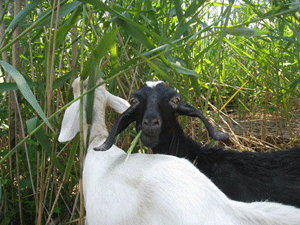
Goat grazing: is an effective tool for invasive and vegetation plant management and re-seeding; restores the land to life, heals the soil, and encourages ecosystem services to function; leads to plant resilience, which helps prevent future problems; and, increases soil organic matter, enhances soil health and moisture, decreases erosion, and supports desired plant species diversity with higher plant vigor. And, it’s a fire mitigation tool!
We brought a herd of 500 goats to conduct an intensive, managed goat grazing operation to manage invasive weeds on 300 acres of tribal lands of the Washoe Tribe of Nevada and California. We spoke before the Tribal Council about using goats for land management, healing the land, and stopping all herbicide use. This project reflects our deep commitment to show that the kind of change we advocate for as an organization is not only possible, but offers an approach that is more effective with long-term cost savings. That’s because we respect nature to reach a sustainable ecological balance. Our work shows how it is done and is a model for other land managers, Tribes, and communities across the nation. It can be used in urban areas, too!
Protecting organic integrity
We advance sustainable and organic practices with our food dollars. But, that requires that we hold the manufacturers and retailers accountable to the standards that are critical to protecting health and the environment. We published When Sustainable Is Less Than Organic, Is It Responsibly Grown?, which raises critical issues on alternative food labeling that undermines the organic label. Whole Foods Market’s Responsibly Grown rating system has been criticized as undermining the organic market by creating a set of standards based on criteria that do not utilize organic practices, values, and principles as its baseline. This allows products and commodities rated as “responsibly grown” to utilize a range of toxic inputs, including synthetic pesticides and fertilizers that are not permitted under organic standards as codified in the Organic Foods Production Act (OFPA). If the scheme was adding elements that have not yet been embraced by organic certification –such as farmworker protection, humane treatment and pasturing of animals, elevated restrictions of some controversial synthetic substances allowed in organic– then Responsibly Grown could have been envisioned as improving elements of sustainability within the organic framework. We continue to challenge the value of Integrated Pest Management (IPM) as a meaningful concept, given its lack of a definition and dependency on toxic chemicals that harm soil health. We sued General Mills for false and deceptive labeling on a product that carries the “natural” label, despite one of the major ingredients being treated with the herbicide glyphosate.
Making sure that organic complies with OFPA is a critical piece of what we as a network must focus on in the year ahead. To that end, we’ve set up our webpage Keeping Organic Strong –our way of engaging organic consumers and growers in ensuring the integrity of the certified organic label.
Bee Protective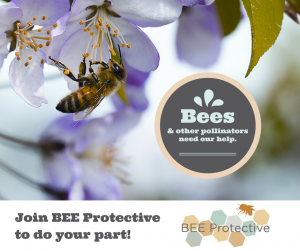
Pollinators continue to be an entry point for many people to engage in the larger issue of pesticide hazards and organic. Our challenge, through our pollinator campaign, called Bee Protective, is to keep the focus on neonicotinoids as symptomatic of a hazardous chemical-intensive food production and land management system and a failed regulatory system with inadequate protections. In this context, we seek to show that a chemical-by-chemical strategy does not move us off the pesticide treadmill, but on to the next family of chemicals with a new or continuing set of problems. We track the science on pesticides and pollinators and have one of the most thorough and up-to-date databases on the scientific literature, called What the Science Shows. We have developed a teaching curriculum on pollinators that we are providing to school systems and a pollinator starter kit. And, we launched a restaurant campaign to coincide with National Pollinator Week.
The National Forum- Mark your calendar
To help support local aCction, we’re holding our 35th national conference, Healthy Hives, Healthy Lives, Healthy Land: Ecological and Organic Strategies for Regeneration at the University of Minnesota, Minneapolis on April 28-29, 2017. Please join us. We maintain a uniquely informative video library of Forum speakers, including leading scientists, researchers, legislators, lawyers, farmers, and land managers. Check out the videos from the 2016 Forum, Cultivating Community and Environmental Health, at the University of Southern Maine in Portland, Maine.
Keeping regulatory deficiencies in the forefront
Our work to critique ongoing EPA regulatory decisions remains important as we seek to effect a shift to organic and ecological practices. Whether it is our comments on glyphosate or the systemic insecticide sulfoxafor, a neonicotinoid cousin, we point out the deficiencies with the agency’s analysis. This was the case with the use of the organophosphate Naled spraying for the threat of Zika virus transmission and EPA and Centers for Disease Control and Prevention (CDC) proclamations of the insecticide’s safety. We wrote to EPA to point out the deficiencies in its assessment of bystander exposure to Naled and put out a press release, EPA and CDC Mislead Local and State Officials and the Public on Safety of Mosquito Pesticides Used for Zika Virus. EPA wrote us back, acknowledging that it was seeking more information on the threat associated with Naled exposure through mosquito spray programs. With the large bee kill in South Carolina after a mosquito spraying, our piece, Mosquito Control and Pollinator Health: Protecting Pollinators in the Age of Zika and Other Emerging Mosquito Diseases, was timely.

The Food and Drug Administration (FDA) announcement that it was phasing out triclosan and other antimicrobials from liquid soaps gave us an opportunity to declare a regulatory victory and at the same time point out the deficiencies in allowing continued use in toothpaste and non-cosmetic products, such as socks, underwear and other textiles, hair brushes, cutting boards, computer keyboards, toys and other plastics (regulated by EPA). Since 2004, Beyond Pesticides has worked to bring public attention to the dangers surrounding the proliferate use of triclosan in consumer goods. A petition submitted to both FDA and EPA by Beyond Pesticides in 2010 calls for the ban on triclosan based on the unnecessary health and environmental risks involved with its use, given the availability of safer alternatives. With the growing public awareness and the evolving market shift away from triclosan, the time is now for a complete federal ban on this unnecessary chemical. We argue that FDA should expand its ban on triclosan in hand soaps to all over-the-counter products, including toothpaste. And, it is critically important that EPA now step up to do the same for all the consumer product uses that it regulates. Beyond Pesticides’ work, joined by others, resulted in many manufacturers voluntarily removing triclosan from its products. Because of our work, by the time that FDA stepped in, there was little opposition to regulatory action.
Genetic Engineered Ingredient Labeling
With the growth of genetically engineered (GE) crops, we have learned that farmers are using more pesticides on herbicide-tolerant plants and seeing more weed resistance, which is forcing the development of new more toxic pesticide formulations. Genetic drift contaminates organic and the public is kept in the dark about which food products on the grocery store shelves contain GE ingredients. Meanwhile, despite losses on the federal and state front to require labeling, with public pressure companies started to respond –but is it misleading? Starting with Campbell’s Soup Company, companies announced that they will label for genetically engineered ingredients and then supported mandatory labeling requirements, leading to the passage of the Biotechnology Food Labeling and Uniformity Act (S.2621), which requires weak labeling, and preempts states from adopting different and stronger language, such as a warning. Expect to see language on the companies’ website like, “The overwhelming weight of scientific evidence indicates that GMOs are safe and that foods derived from crops using genetically modified seeds are not nutritionally different from other foods.” Our goal is to make sure that GE ingredients and contamination does not invade organic production and products.
Breaking through Power
Our participation in the Ralph Nader event, Breaking through Power (held at Constitution Hall in Washington, DC in September), provided us with a forum to capture the importance of Beyond Pesticides’ mission and work in a 20-minute presentation. Introduced by Jim Hightower, we shared the history of the organization and its vision going forward. It is important to note that we were among the only, if not the only, organization of less than 20 organizations asked to speak that was not founded or supported at its founding by Mr. Nader, but certainly inspired by his advocacy in the public interest. In the years since Beyond Pesticides’ founding, Mr. Nader has spoken at Beyond Pesticides’ forums and supported our work.
Providing the tools for effective action
We maintain and enlarge Beyond Pesticides’ science and policy databases, which serve as an important counterweight to government agencies that ignore the independent peer-reviewed scientific literature. We have grown our Gateway on Pesticide Hazards and Safe Pest Management and Pesticide-Induced Diseases Database, which document the preponderance of science that justifies the policies and practices we advance. We conduct ongoing independent assessments of product ingredients and the supporting science to evaluate their impact on health and the environment. Together, this information supports, in real time, the need for elected officials to advance local policy in the face of federal standards that are not protective of health and the environment.
We will not accept a future with continued and rising toxic pesticide use that threatens our health and the sustainability of the planet. We will build on the successes of the past to meet the challenges of the future.
Thank you again for joining with us this year to sustain and grow these victories. We hope you’ll take some time this holiday season to celebrate these accomplishments, and come together with us next year, refreshed and ready for the serious challenges and new victories that lie ahead.
Best wishes for the Holiday Season and New Year!









